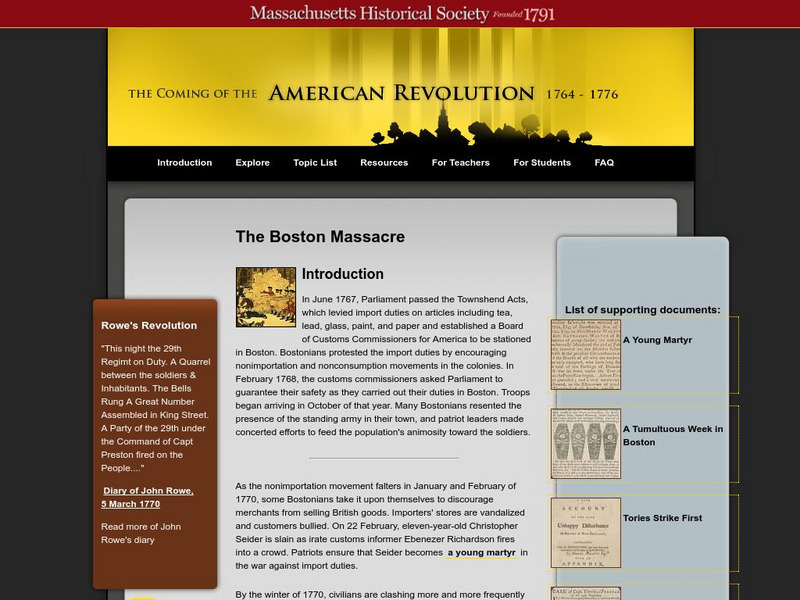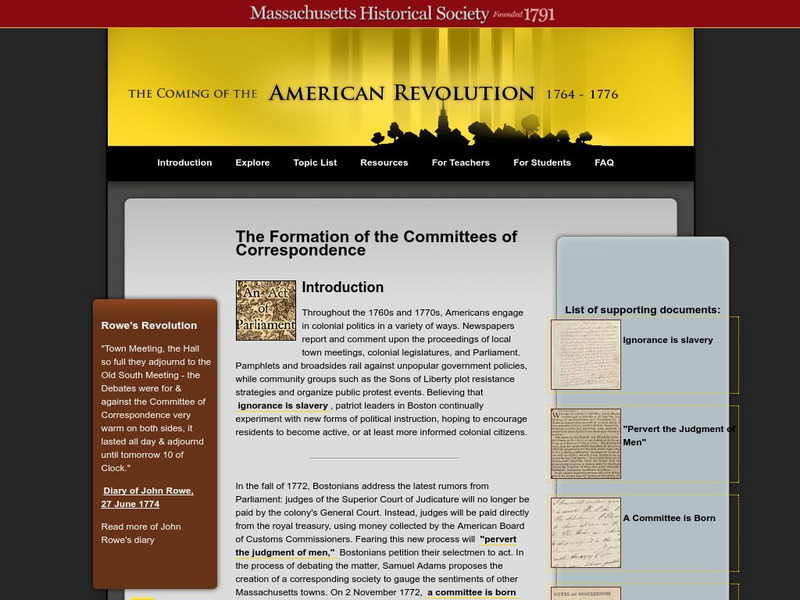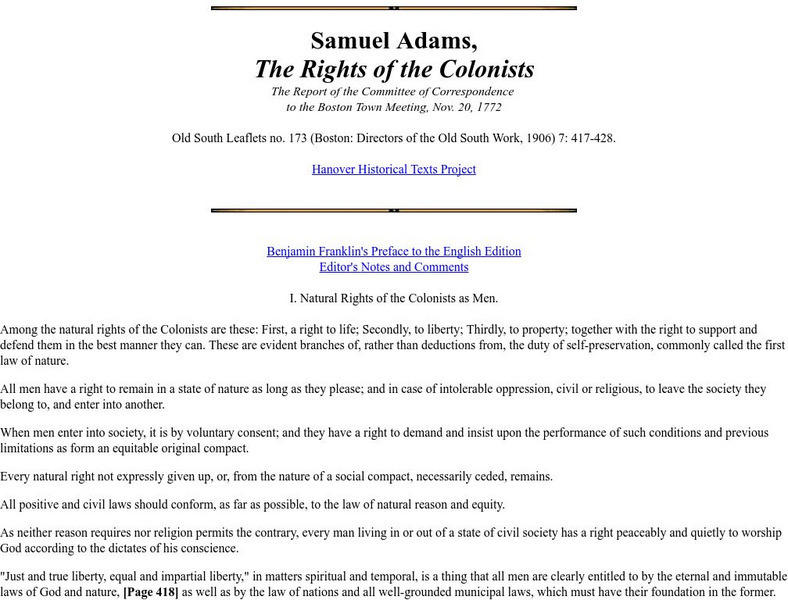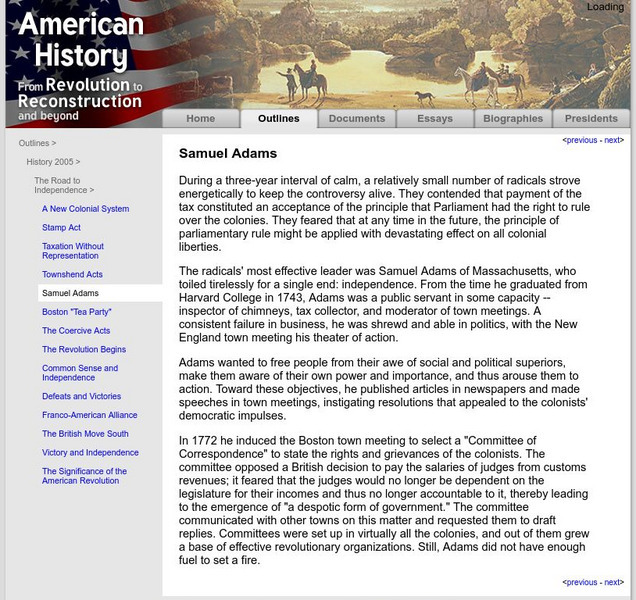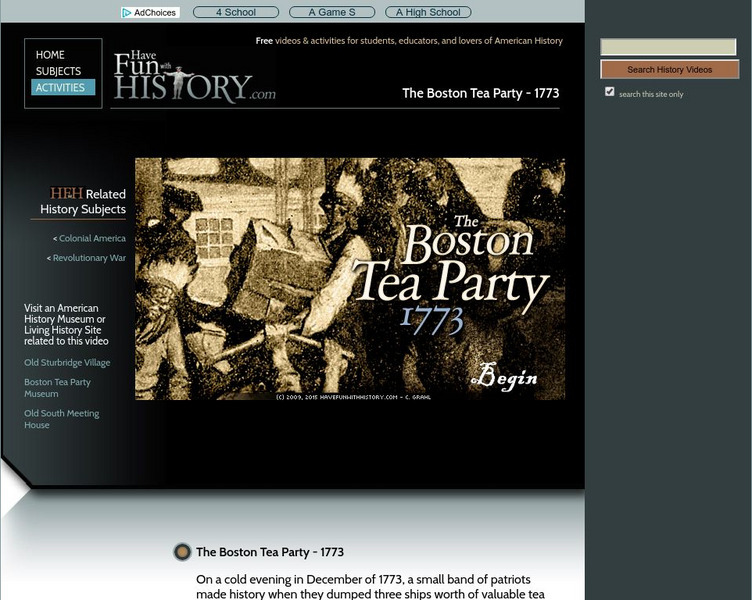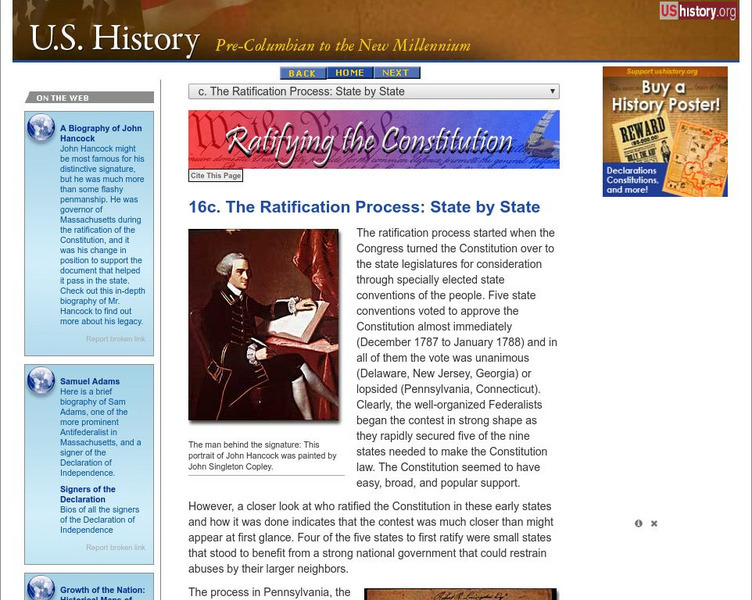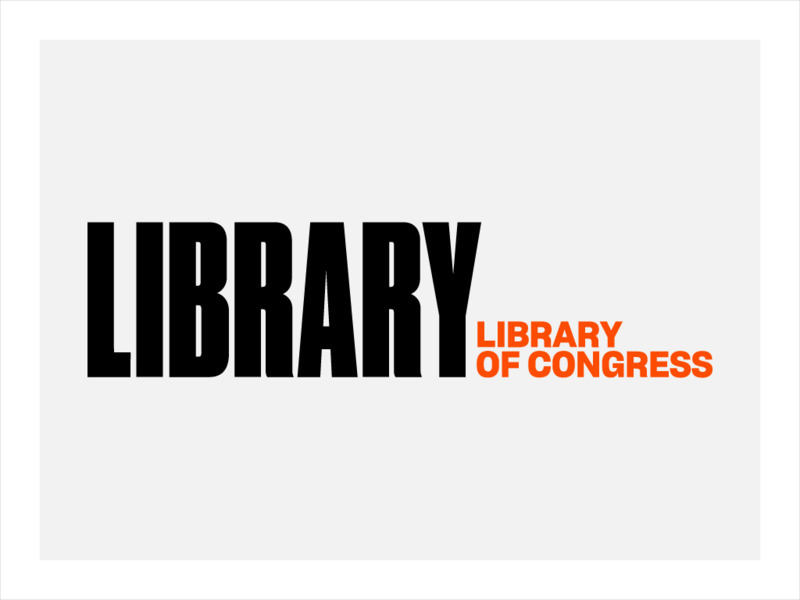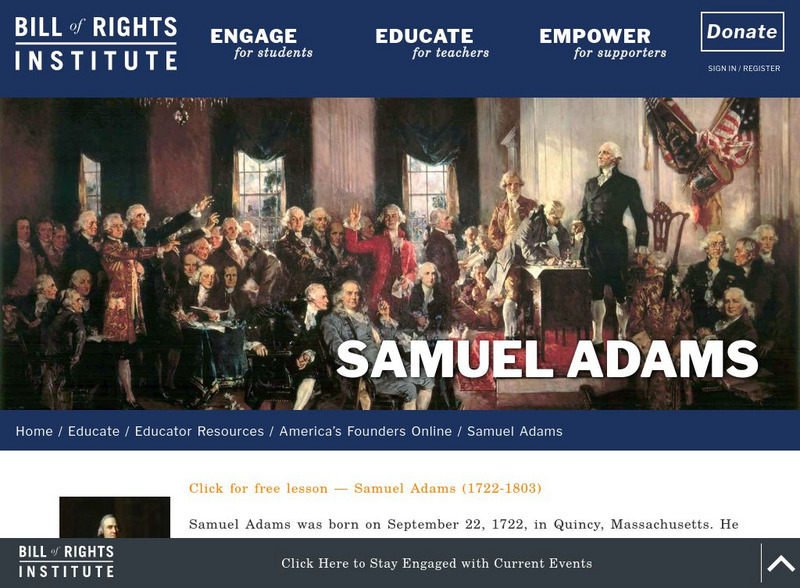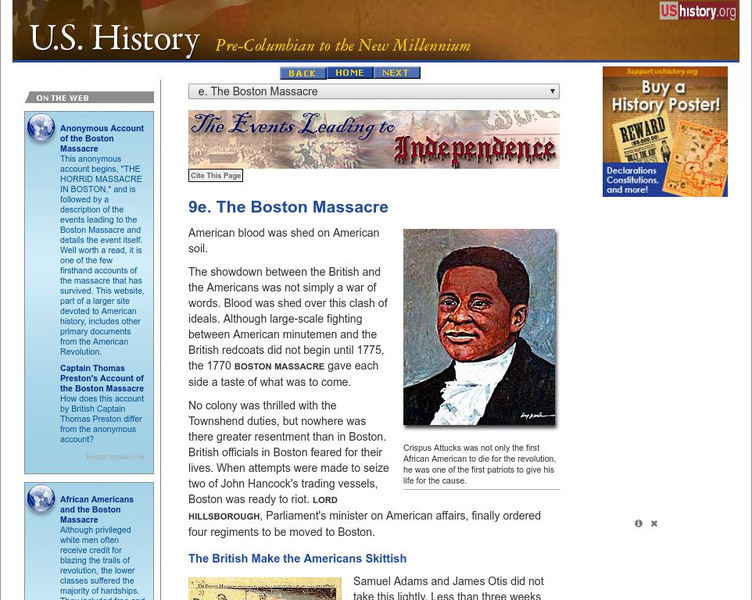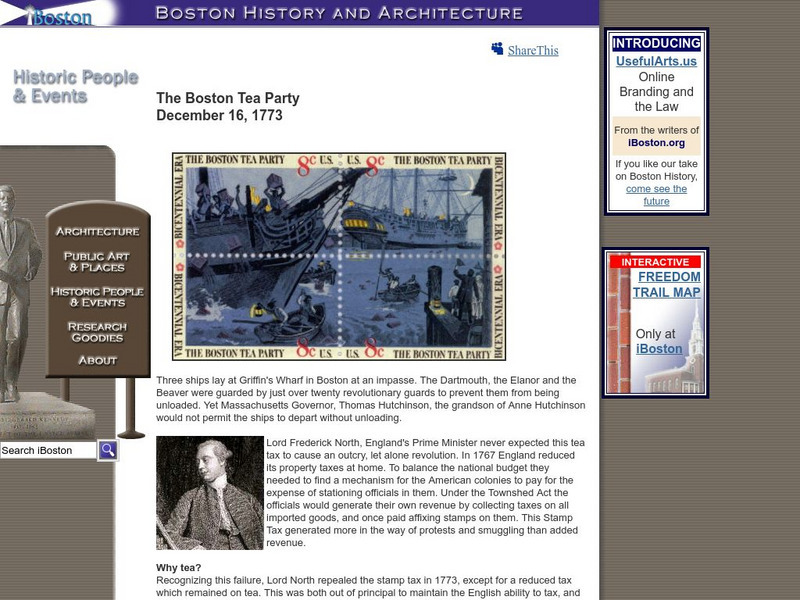Alabama Learning Exchange
American Revolution
Introduce learners to the key players of the American Revolution. Each slide provides biographical information on the following people: John Adams, Samuel Adams, Crispus Attucks, King George III, Lord Cornwallis, Thomas Paine, Polly...
Curated OER
Samuel Adams
In this online interactive history quiz worksheet, students respond to 50 multiple choice questions about Samuel Adams. Students may submit their answers to be scored.
Curated OER
Johnny Tremain for the 21st Century
Seventh graders complete a unit of lessons on the American Revolution based on the novel, 'Johnny Tremain.' They define key vocabulary terms, develop a timeline, write a report on a colonial craft, make a colonial flag, and create a...
Curated OER
A Right to Bear Arms - One Patriot's View
Learners research Samuel Adams' role in the crafting of the Second Amendment. They consider how Adams' views evolved with time and write a one-page response linking their research to current events.
Massachusetts Historical Society
Mhs: Coming of the American Revolution: Boston Massacre
Provides a detailed overview of the events surrounding the Boston Massacre in 1770 and resulting trial. Includes a list of supporting documents and great resources for teachers.
Massachusetts Historical Society
Mhs: Coming of the American Revolution: Committees of Correspondence
Discusses the formation of the committees of correspondence movement starting with the first one in Boston in 1772. Includes supporting primary source documents and great resources for teachers including lesson plans.
University of Missouri
Famous Trials: Boston Massacre Trials, 1770
A comprehensive outline and chronology of the Boston Massacre of 1770, where British troops fired on protestors, killing five of them. Includes testimonies from the trial of Captain Thomas Preston and eight British soldiers, and profiles...
The History Place
The History Place: American Revolution: Prelude to Revolution
This site from The History Place offers a timeline of events of the Revolution. It offers information about England's involvement with the United States. Pictures are provided throughout along with links to additional information.
Hanover College
Hanover College: The Rights of the Colonists
The original text of "The Report of the Committee of Correspondence to the Boston Town Meeting, Nov. 20, 1772", written by Samuel Adams and including the preface by Benjamin Franklin written for the edition printed in England.
University of Groningen
American History: Outlines: Boston Tea Party
Gives a historical description of the events that led up to the Boston Tea Party (1773).
University of Groningen
American History: Outlines: Taxing and Representation
Describes why the colonies objected to being taxed directly by Parliament for revenue. Contains quotes by James Otis and Samuel Adams. Explains the significance of the Stamp Act.
University of Groningen
American History: Outlines: Samuel Adams
Overview on the early American radical, Samuel Adams, a political organizer who called for American independence.
Robin Chew
Samuel Adams: American Patriot & Politician
Read a brief overview of the life of Samuel Adams, one of the founding fathers of the United States. Links to other resources about Adams are included.
The History Place
The History Place: A New Nation (1784 to 1790)
This site from The History Place provides a timeline of American history between 1784 and 1790. Mentions many famous people and events of the era. Links to John Adams, Thomas Jefferson, Samuel Adams, James Madison, the Constitution, Bill...
Have Fun With History
Have Fun With History: The Boston Tea Party: 1773
An interactive slide show about the Boston Tea Party with links to museums and sites related to the Boston Tea Party.
Independence Hall Association
U.s. History: The Ratification Process: State by State
The ratification of the Constitution was placed at the hands of the state legislatures. Read about which states supported the ratification, which were opposed, and why. Find out why, even after the requisite number of states had voted...
Independence Hall Association
U.s. History: Committees of Correspondence
See how organization can be a stepping stone to freedom. Read about the actions and the reasons behind those actions of the Committees of Correspondence prior to the Revolutionary War.
Library of Congress
Loc: Today in History: March 5: The Boston Massacre
In a feature titled "Today in History," the Library of Congress explores the Boston Massacre. The events of March 5, 1770 are discussed alongside paintings and engravings from the library's collection.
Other
Reformed.org: Samuel Adams: Re Evaluating a Journalistic Calvinist
A biographic and political analysis that takes issue with traditional portrayals of Samuel Adams as vengeful and erratic or as a scheming politician. Instead, this analysis presents him as a principled person strongly influenced by...
Independence Hall Association
U.s. History: The Boston Patriots
Read about five famous Boston patriots who played a large role in the events prior to the American Revolution and the Revolution itself.
Bill of Rights Institute
Bill of Rights Institute: Samuel Adams
Samuel Adams was born on September 22, 1722, in Quincy, Massachusetts. He entered Harvard College at the age of 14. During the 1760s, Adams became a leader of the Patriot resistance to the British government's attempt to tax the American...
Independence Hall Association
U.s. History: The Boston Massacre
The Boston Massacre was a watershed event in the relations between the American colonists and their mother country. Read about what led up the shooting, the event itself, and its aftermath. Included is a contemporary account of the...
PBS
Pbs Africans in America: The Boston Massacre
From its series entitled "Africans in America," PBS offers a comprehensive overview of the Boston Massacre from the viewpoint of the poor, the oppressed, and enslaved or free Africans. The article highlights how these individuals were...
Other
Boston History and Architecture: Boston Tea Party
Citing the Boston Tea Party has been a rallying cry. Find out what the real reasons were behind the actions of the Sons of Liberty on that night of December 16, 1773. What made the colonists so angry and the reactions of the British lay...






